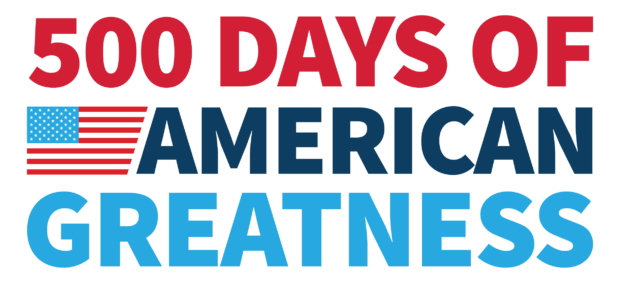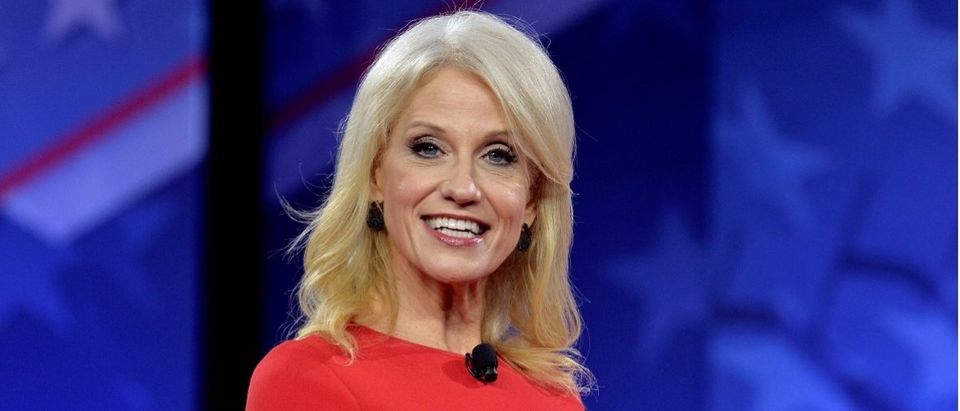June 4, 2018 marks the 500th day of President Donald Trump’s tenure in the Oval Office, and the White House intends to use the occasion as a way to highlight the president’s accomplishments so far with a “500 days of American greatness” media campaign, White House officials tell The Daily Caller.
White House counselor Kellyanne Conway reviewed the last 500 days of the Trump administration in a lengthy exclusive interview with TheDC. The 500 day mark comes at a pivotal in-between moment for the White House as the president increasingly hits the campaign trail in a bid to help Republicans preserve the House of Representatives and the Senate.
“We look at the 500 days as a more formal inflection point to remind everybody of the sheer velocity and volume that has marked the last 500 days,” she said, adding that if she could think of a single uniting theme for the beginning of the administration it is that “America is back.”
The 500 Days

“500 Days OF American Greatness”
Conway regaled TheDC in detail with what the White House considers its accomplishments to date, noting that “people are more prosperous, they’re more secure, the country is more respected on the world stage. Everything from the consumer confidence among small business owners, manufacturers, consumers, major employers in this country, is up.”
“It’s a different approach of a business man, who has signed the back and front of a paycheck, who understands risk and reward, who understands how to create a job,” she said. The presidential counselor also pointed to ongoing diplomatic talks with North Korea, exiting the Paris Climate Accords, imposing tariffs on several countries, and diminishing ISIS.
The Trump Administration’s Greatest Setback
TheDC pressed Conway on what the administration’s greatest setback was in the last 500 days of the Trump administration, which she considered “not having enough votes to pass even more legislation more quickly.” The presidential counselor noted that Trump has attempted to go as far around this impediment as he can through existing powers and executive actions.
On Undoing Obama’s Legacy
Conway rejected the notion that “Making America Great Again” is simply a rollback of former President Barack Obama’s legacy, saying, “one thing I noted recently to someone is how infrequently President Obama’s name is mentioned during our workday.” She explained: “It’s not so much that we say ‘oh let’s get rid of what President Obama was doing,’ it’s more what do we do for the 30 million Americans who have no health insurance? Who were promised and lied to that you could keep your doctor and keep your coverage.”
The presidential counselor pointed more towards Trump’s willingness to do what several of his predecessors were unable to do such as move the U.S. Embassy to Jerusalem and sign into law legislation like the Right to Try Act, as well as increasing health care choice for veterans.
On Midterm Elections
TheDC asked Conway what Trump’s message was to the country in his bid to elect more Republicans to Congress in the midterm elections and to what end he would use such votes. “If the president gets more votes and support in the Congress he will be able to push for his immigration agenda, he’ll be able to do more on NAFTA, he will be able to get even more judges confirmed even more swiftly,” Conway said.
On The Trump Administration And The Media
“My grievance from the beginning is not so much biased coverage, but incomplete coverage which doesn’t connect information to the people who need it,” Conway said, adding, “we want to make sure Americans are getting the information they need, the news they can use. We want people to know the specifics, we want them to understand what the implications of a policy is for them and their lives.”
TheDC asked Conway to respond to critics of the White House who say the legacy of Trump’s 500 days in office has been “leaks, chaos, and staff turnover.” She explicitly rejected the characterization, telling TheDC, “Respectfully, your question presumes it’s relevant or true.”
“It’s not relevant or true. I keep hearing about these leaks. Secretary Pompeo went to North Korea twice and nobody found out until he was on his way back. There is a lot of information that never sees the light of day. Leaks are often a way for people to settle personal scores or to shiv each other,” she said.
Conway referenced a recent article about White House leaks from the 1980’s. “I guess it exists in every White House,” she said, and took aim at members of the media. “What I think is going is that people can cover ‘chaos, churn, palace intrigue’ rather than learn the ins and outs of policy,” she said. “Fundamentally it is easier to write those stories than it is to learn the ins and outs of trade with China, the history of North and South Korea, what the waters of the United States is; it’s just easier to do that. I think the president has made some people lazy and crazy that cover him.”
“People who cover the president are going to have to make a fundamental decision. ‘How do I cover this president, do I cover him substantively, do I cover him with the bark and snark I use on social media that would never pass an editor’s desk?'”
She added: “Another big problem that’s happening is that what some reporters would say on Twitter would never pass editorial muster and I would say they often don’t have the courage to say it in person. I call it social media muscle and cable news cojones.”


